Rimbaud
Selected Poems
Translated by A. S. Kline © Copyright 2003, 2008 All Rights Reserved
This work may be freely reproduced, stored and transmitted, electronically or otherwise, for any non-commercial purpose. Conditions and Exceptions apply.
Contents
- First Evening
- Sensation
- Romance
- Eighteen Seventy
- Rage of The Caesars
- The Famous Victory of Saarbrucken
- A Winter Dream
- Evil
- My Bohemia: A Fantasy
- At The Green Inn
- The Sly Girl
- The Sleeper in the Valley
- Poets at Seven Years
- The Seekers of Lice
- The Drunken Boat
- Vowels
- The Rooks
- Memory
- Teardrop
- The Song of the Highest Tower
- Eternity
- O Seasons, O Chateaux
First Evening
(Première Soirée)
She was barely dressed though,
And the great indiscreet trees
Touched the glass with their leaves,
In malice, quite close, quite close.
Sitting in my deep chair,
Half-naked, hands clasped together,
On the floor, little feet, so fine,
So fine, shivered with pleasure.
I watched, the beeswax colour
Of a truant ray of sun-glow
Flit about her smile, and over
Her breast – a fly on the rose.
– I kissed her delicate ankle.
She gave an abrupt sweet giggle
Chiming in clear trills,
A pretty laugh of crystal.
Her little feet under her slip
Sped away: ‘Will you desist!’
Allowing that first bold act,
Her laugh pretended to punish!
– Trembling under my lips,
Poor things, I gently kissed her lids.
– She threw her vapid head back.
‘Oh! That’s worse, that is!’...
‘Sir, I’ve two words to say to you...’
– I planted the rest on her breast
In a kiss that made her laugh
With a laugh of readiness....
– She was barely dressed though,
And the great indiscreet trees
Touched the glass with their leaves
In malice, quite close, quite close.
1870
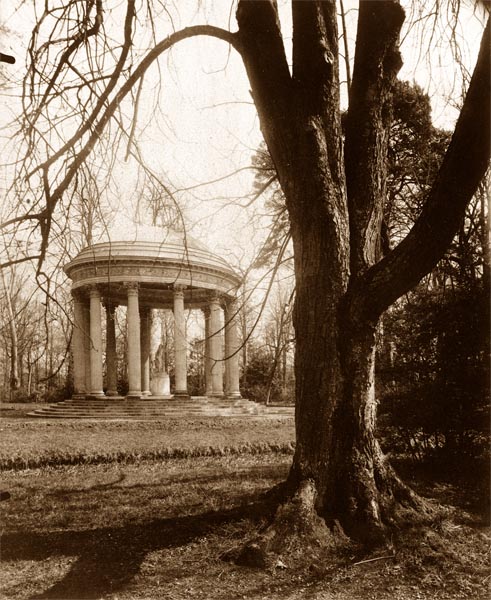
‘The Temple of Love, Petit Trianon (1902)’
Eugène Atget (French, 1857 - 1927), Getty Open Content Program
Sensation
(Sensation)
Through the blue summer days, I shall travel all the ways,
Pricked by the ears of maize, trampling the dew:
A dreamer, I will gaze, as underfoot the coolness plays.
I’ll let the evening breeze drench my head anew.
I shall say – not a thing: I shall think – not a thing:
But an infinite love will swell in my soul,
And far off I shall go, a bohemian,
Through Nature – as happy, as if I had a girl.
March 1870
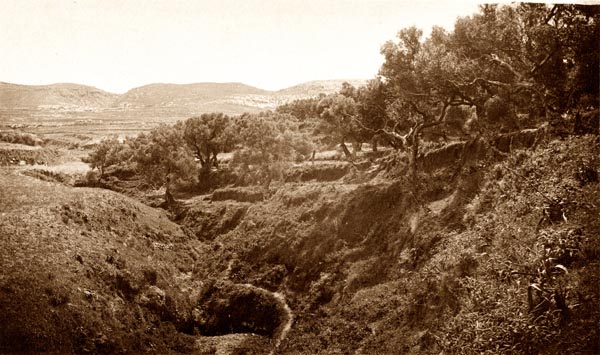
‘Kaleppa’
William J. Stillman (American, 1828 - 1901), Getty Open Content Program
Romance
(Roman)
I
You’re not serious, when you’re seventeen.
– One fine evening, tired of beers and lemonade,
The noisy cafés with their dazzling gleam!
– You walk the lime-trees’ green on the Parade.
The lime-trees smell so fine on fine June evenings!
The air’s so sweet sometimes you close your eyes:
The wind is full of sounds – the town’s nearby –
Blows the smell of beer, and the scent of vines...
II
– Then you make out a little tiny tatter
Of sombre azure framed by a twig of night,
Pierced by a fatal star, it melts, after
Soft tremblings, tiny and perfectly white...
June night! And Seventeen! – You get tipsy.
The sap’s champagne and blurs every feature...
You wander: you feel a kiss on your lips
That quivers there, like some tiny creature....
III
Your mad heart goes Crusoeing the romances,
– Where in the pale lamp’s glare your eyes follow
A young girl going by with sweet little glances
Below the gloom of her father’s stiffened collar...
And because she finds you immensely naïve
As by, in her little ankle boots, she trips
She turns away alertly with a quick shrug...
– And cavatinas die away on your lips....
You’re in love. Taken till the month of August.
You’re in love. –Your sonnets make her smile.
All your friends have gone: you’re in bad taste.
– Then the adored, one evening, deigns to write!
That evening.... you return to the cafés gleam,
You call out for beer or lemonade...
– You’re not serious, when you’re seventeen
And the lime-trees are green on the Parade.
23 September, 1870
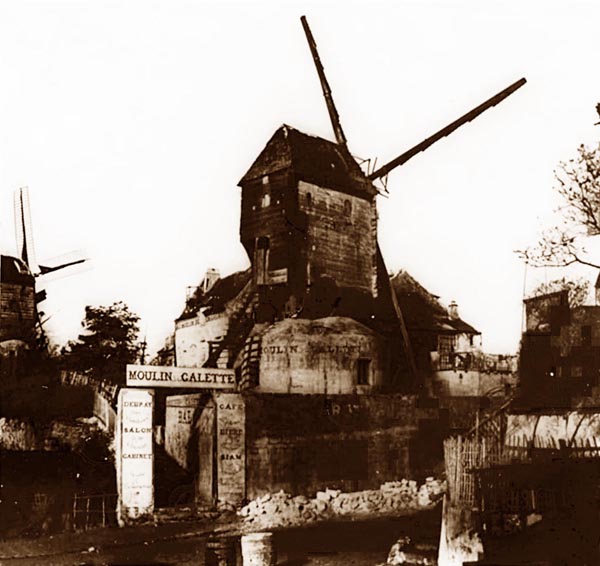
‘Montmartre (près Paris)’
Possibly Ferrier Père-Fils et Soulier (c. 1855 - c. 1865), The Rijksmuseum
Eighteen Seventy
(Morts de Quatre-Vingt-Douze)
...Frenchmen of ‘70, Bonapartists, Republicans,
remember your forefathers of ’92...
Paul de Cassagnac, (Le Pays)
You Dead of ninety-two and ninety-three,
Who, pale from the great kiss of Liberty,
Crushed, calm, beneath your wooden shoes
That yoke that weighs on human brows and souls:
Men exalted, great in agony,
You whose hearts raged with love, in misery,
O soldiers that Death, noble Lover, has sown
In all the old furrows, so they’ll be reborn:
You whose blood washed every soiled grandeur,
Dead of Valmy, Dead of Fleurus, Dead of Italy,
O millions of Christs with eyes gentle and sombre:
We’ve let you fall asleep with the Republic,
We, cowering under kings as if under blows.
– They’re telling tales of you so we’ll remember!
Done at Mazas, 3 September 1870
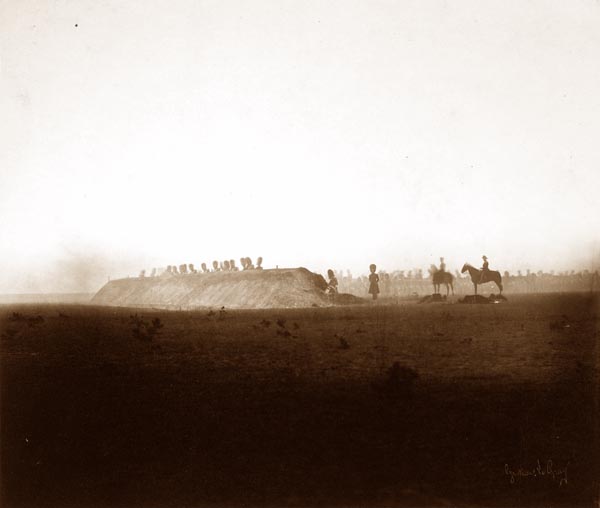
‘Cavalry Maneuvres, October 3’
Gustave Le Gray (French, 1820 - 1884), Getty Open Content Program
Rage of The Caesars
(Napoleon III after Sedan)
(Rages Des Césars)
The pale Man walks through the flowery scene,
Dressed in black, a cigar between his teeth:
The pale Man thinks of the flowers of the Tuileries
And sometimes his fishlike-eye grows keen...
The Emperor’s drunk with his twenty-year orgy!
He said to himself: ‘I’ll snuff out Liberty
As if it were a candle, and so delicately!”
Liberty revives! He feels himself exhausted!
He’s in prison. – Oh! What name is it that trembles
On his mute lips? What relentless regret does he feel?
No one will ever know. The Emperor’s eye’s dark.
He recalls the ‘Accomplice’, perhaps, in spectacles...
Watching a thin wreathe of smoke steal,
As on those Saint-Cloud evenings, from his cigar.
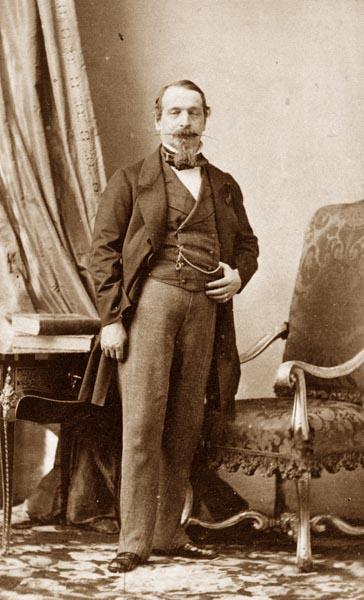
‘Napoleon III’
Disdéri & Cie. (1862 - 1865), Getty Open Content Program
Note: This is Napoleon III, in 1870, imprisoned and ill, at Wilhelmshoehe in Prussia. Émile Ollivier, his Minister at the outbreak of the Franco-Prussian War, who failed to oppose its declaration, is the ‘Accomplice’.
The Famous Victory of Saarbrucken
(L’Éclatante Victoire de Sarrebrück)
(Belgian print, brilliantly tinted, sold at Charleroi, 35 centimes)
At centre, the Emperor, blue-yellow, in apotheosis,
Gallops off, ramrod straight, on his fine gee-gee,
Very happy – since everything he sees is rosy,
Fierce as Zeus, and as gentle as a Daddy is:
The brave Infantrymen taking a nap, in vain,
Under the gilded drums and scarlet cannon,
Rise politely. One puts his tunic back on,
And, turns to the Chief, stunned by the big name!
On the right, another, leaning on his rifle butt,
Feeling the hair rise at the back of his neck,
Shouts: ‘Vive L’Empereur!!” – his neighbour’s mute...
A shako rises, like a black sun...– In the midst
The last, a simpleton in red and blue, lying on his gut
Gets up, and, – showing his arse – asks: “On what?”
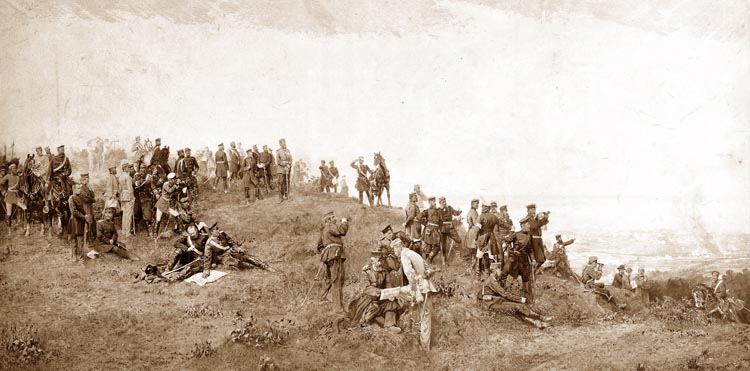
‘Sur la Hauteurs de la Marfee le 1er juin 70’
Gustave Le Gray (French, 1820 - 1884), Getty Open Content Program
A Winter Dream
(Rêvé pour l’Hiver)
To ... Her
In winter we’ll travel in a little pink carriage
With cushions of blue.
We’ll be fine. A nest of mad kisses waits
In each corner too.
You’ll shut your eyes, not to see, through the glass,
Grimacing shadows of evening,
Those snarling monsters, a crowd going past
Of black wolves and black demons.
Then you’ll feel your cheek tickled quite hard...
A little kiss, like a maddened spider,
Will run over your neck...
And you’ll say: “Catch it!” bowing your head,
– And we’ll take our time finding that creature
– Who travels so far...
In the railway carriage, 7 October 1870

‘Pullman Palace Sleeping Car’
Carleton Watkins (American, 1829 - 1916), Getty Open Content Program
Evil
(Le Mal)
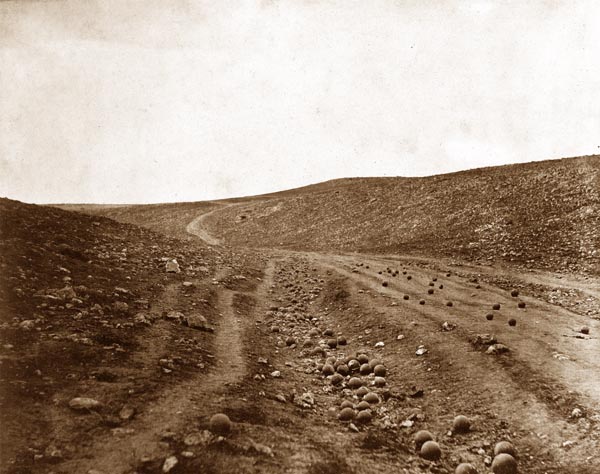
‘Valley of the Shadow of Death’
Roger Fenton (English, 1819 - 1869), Getty Open Content Program
While the red spittle of the grape-shot
Whistles all day in the infinite blue sky:
While the battalions, scarlet or green, fly,
By the King who jeers, en masse, into the pot:
While the terrible stupidity grinds and crushes,
And makes a smoking heap of a thousand men:
– Poor Dead! In summer, among the rushes,
In your joy, sacred Nature, who created them!...
– There’s a God, who laughs at altar-cloths
Of damask, incense, and great gold chalices:
Who dozes to Hosannas for lullaby,
And wakes when mothers, gathered in their grief,
Weeping under their old black bonnets, sigh
And yield Him the coin knotted in their handkerchief.
My Bohemia: A Fantasy
(Ma Bohème: Fantaisie)
I ran off, fists in my ragged seams:
Even my overcoat was becoming Ideal:
I went under the sky, Muse! I was yours:
Oh! What miraculous loves I dreamed!
My only pair of pants was a big hole.
– Tom Thumb the dreamer, sowing the roads there
With rhymes. My inn the Sign of the Great Bear.
– My stars in the sky rustling to and fro.
I heard them, squatting by the wayside,
In September twilights, there I felt the dew
Drip on my forehead, like a fierce coarse wine.
Where, rhyming into the fantastic dark,
I plucked, like lyre strings, the elastics
Of my tattered shoes, a foot pressed to my heart.
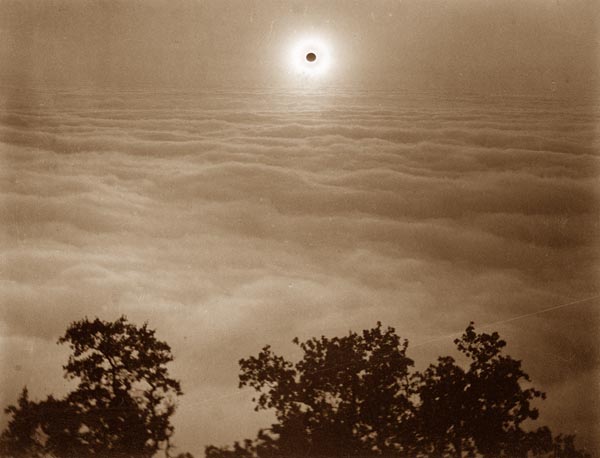
‘Solar Eclipse’
Carleton Watkins (American, 1829 - 1916), Getty Open Content Program
At The Green Inn
(Au Cabaret-Vert)
For eight days, I’d ripped up my boots
On the road stones. I’d made Charleroi.
– At the Green Inn: I ordered bread
Buttered, along with half-cold ham.
Happy, I stretched my legs out under the table,
A green one: considering the naïve prints
On the walls. – And it was charming,
When the girl with big tits and lively eyes,
– That one, just a kiss wouldn’t scare her! –
Smiling, brought me slices of bread and butter,
With lukewarm ham on a coloured platter,
Ham, white and pink, a fragrant garlic clove,
– And filled a huge beer mug high, its foam
Turned by a ray of late sunlight to gold.
The Sly Girl
(La Maline)
In the brown dining-room, its perfumed air
Full of the smell of wax and fruit, at ease
I gathered a plate of who knows what Belgian
Dish, and marvelled in my enormous chair.
Eating I listened to the clock – silent, happy.
The kitchen door opened with a gust,
– And the serving girl came in, who knows why,
Shawl half-off, hair dressed cunningly.
And, touching her little finger tremblingly
To her cheek, a pink and white velvet-peach,
And making a childish pout with her lips,
She tidied the plates to put me at my ease:
– Then, just like that – to get a kiss, for certain –
Whispered: ‘Feel: It’s caught a cold, my cheek...’
Charleroi, October 1870
![The Clouds are Broken in the Sky [Adaptation]](https://www.poetryintranslation.com/pics/French/interior_rimbaud_maline.jpg)
‘Charleroi (Belgique) - Maison du Bailli au Début du XXe Siècle’
Collection Étienne Grandchamps (librairie Grandchamps-Fafouille), Wikimedia Commons
The Sleeper in the Valley
(Le Dormeur du Val)
It’s a green hollow where a river sings
Madly catching white tatters in the grass.
Where the sun on the proud mountain rings:
It’s a little valley, foaming like light in a glass.
A conscript, open-mouthed, his bare head
And bare neck bathed in the cool blue cress,
Sleeps: stretched out, under the sky, on grass,
Pale where the light rains down on his green bed.
Feet in the yellow flags, he sleeps. Smiling
As a sick child might smile, he’s dozing.
Nature, rock him warmly: he is cold.
The scents no longer make his nostrils twitch:
He sleeps in the sunlight, one hand on his chest,
Tranquil. In his right side, there are two red holes.
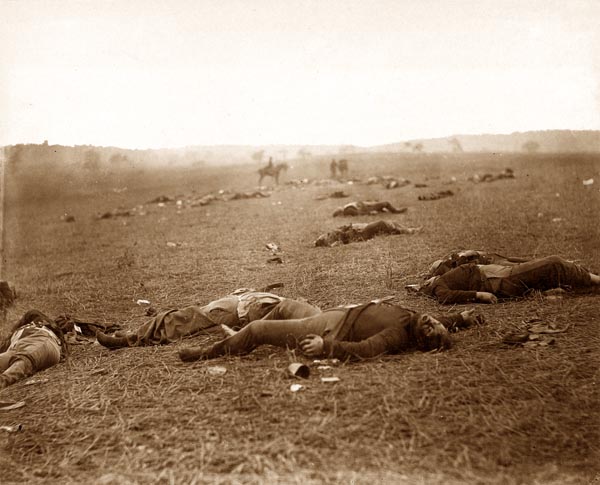
‘A Harvest of Death’
Timothy H. O'Sullivan (American, c. 1840 - 1882), Getty Open Content Program
Poets at Seven Years
(Les Poëtes de Sept Ans)
And the mother, closing the work-book
Went off, proud, satisfied, not seeing,
In the blue eyes, under the lumpy brow,
The soul of her child given over to loathing.
All day he sweated obedience: very
Intelligent: yet dark habits, certain traits
Seemed to show bitter hypocrisies at work!
In the shadow of corridors with damp paper,
He stuck out his tongue in passing, two fists
In his groin, seeing specks under his shut lids.
A doorway open to evening: by the light
You’d see him, high up, groaning on the railing
Under a void of light hung from the roof. In summer,
Especially, vanquished, stupefied, stubborn,
He’d shut himself in the toilet’s coolness:
He could think in peace there, sacrificing his nostrils.
When the small garden cleansed of the smell of day,
Filled with light, behind the house, in winter,
Lying at the foot of a wall, buried in clay
Rubbing his dazzled eyes hard, for the visions,
He listened to the scabbed espaliers creaking.
Pity! His only companions were those children
Bare-headed and puny, eyes sunk in their cheeks,
Hiding thin fingers yellow and black with mud
Under old clothes soiled with excrement,
Who talked with the sweetness of the simple-minded!
And if his mother took fright, surprising him
At his vile compassions: the child’s deep
Tenderness overcame her astonishment.
All fine. She’d had the blue look, – that lies!
At seven he was making novels about life
In the great desert, where ravished Freedom shines,
Forests, suns, riverbanks, savannahs! – He used
Illustrated weeklies where he saw, blushing,
Smiling Italian girls, and Spanish women.
When the daughter of next door workers came by,
Eight years old – in Indian prints, brown-eyed,
A little brute, and jumped him from behind,
Shaking out her tresses, in a corner,
And he was under her, he bit her buttocks,
Since she never wore knickers:
– And, bruised by her fists and heels,
Carried the taste of her back to his room.
He feared the pallid December Sundays,
When, hair slicked back, at a mahogany table,
He read from a Bible with cabbage-green margins:
Dreams oppressed him each night in the alcove.
He didn’t love God: rather those men in the dusk,
Returning, black, in smocks, to the outer suburbs
Where the town-crier, with a triple drum beat,
Made the crowds laugh and murmur at the edicts.
– He dreamed of the amorous prairies, where
Luminous swells, pure odours, gold pubescences,
Stirred in the calm there, and then took flight!
And above all how he savoured sombre things,
When, in his bare room behind closed shutters,
High, and blue, and pierced with acrid damp,
He read his novel, mooned over endlessly,
Full of drowned forests, leaden ochre skies,
Flowers of flesh opening in star-filled woods,
Dizziness, epilepsies, defeats, compassion!
– While the street noises rumbled on below,
Lying alone on pieces of unbleached canvas,
With a violent presentiment of setting sail!
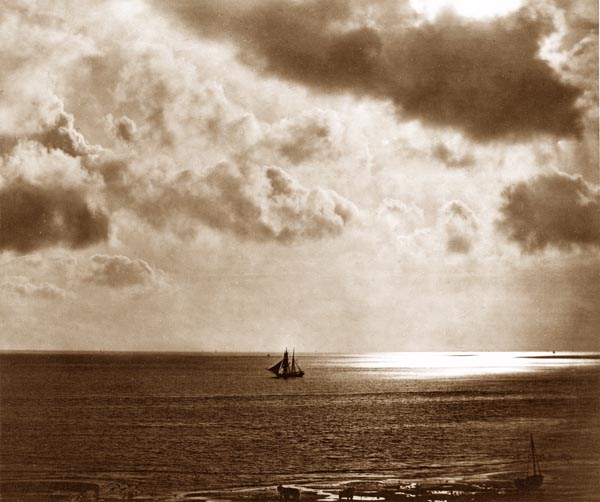
‘Brick sur l'eau’
Gustave Le Gray (French, 1820 - 1884), Getty Open Content Program
The Seekers of Lice
(Les Chercheuses de Poux)
When the child’s brow, tormented by red,
Implores the white crowd of half-seen dreams,
Two charming sisters come close to his bed
Slender-fingered, with silver nails it seems.
They sit the child down in front of the window,
Wide open to where blue air bathes tangled flowers,
And through his thick hair full of dewfall,
Move their fine fingers, fearful, magical.
He hears the sighing of their cautious breath
That flows with long roseate vegetal honeys,
And is interrupted sometimes by a hiss,
Saliva caught on the lips or desire to kiss.
He hears their dark lashes beating in perfumed
Silence: and their fingers, electrified and sweet
Amidst his grey indolence, make the deaths
Of little lice crackle beneath their royal treat.
It’s now the wine of Sloth in him rises, the sigh
Of a child’s harmonica that can bring delirium:
Prompted by slow caresses, the child feels then
An endlessly surging and dying desire to cry.
![Light and Love [Detail]](https://www.poetryintranslation.com/pics/French/interior_rimbaud_lice.jpg)
‘Light and Love [Detail]’
Julia Margaret Cameron (British, born India, 1815 - 1879), Getty Open Content Program
The Drunken Boat
(Le Bateau Ivre)
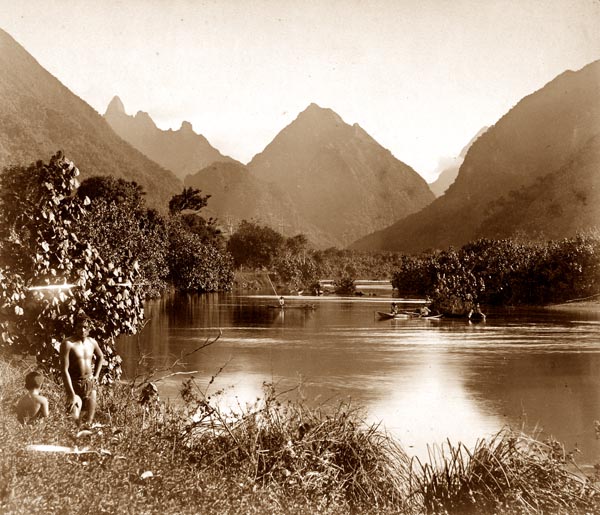
‘Tahiti. Rivière de Taubira (Presquîle de Taïarapu)’
Charles Gustave Spitz (active Tahiti 1870s - 1880s), Getty Open Content Program
As I floated down impassive Rivers,
I felt myself no longer pulled by ropes:
The Redskins took my hauliers for targets,
And nailed them naked to their painted posts.
Carrying Flemish wheat or English cotton,
I was indifferent to all my crews.
The Rivers let me float down as I wished,
When the victims and the sounds were through.
Into the furious breakers of the sea,
Deafer than the ears of a child, last winter,
I ran! And the Peninsulas sliding by me
Never heard a more triumphant clamour.
The tempest blessed my sea-borne arousals.
Lighter than a cork I danced those waves
They call the eternal churners of victims,
Ten nights, without regret for the lighted bays!
Sweeter than sour apples to the children
The green ooze spurting through my hull’s pine,
Washed me of vomit and the blue of wine,
Carried away my rudder and my anchor.
Then I bathed in the Poem of the Sea,
Infused with stars, the milk-white spume blends,
Grazing green azures: where ravished, bleached
Flotsam, a drowned man in dream descends.
Where, staining the blue, sudden deliriums
And slow tremors under the gleams of fire,
Stronger than alcohol, vaster than our rhythms,
Ferment the bitter reds of our desire!
I knew the skies split apart by lightning,
Waterspouts, breakers, tides: I knew the night,
The Dawn exalted like a crowd of doves,
I saw what men think they’ve seen in the light!
I saw the low sun, stained with mystic terrors,
Illuminate long violet coagulations,
Like actors in a play, a play that’s ancient,
Waves rolling back their trembling of shutters!
I dreamt the green night of blinded snows,
A kiss lifted slow to the eyes of seas,
The circulation of unheard-of flows,
Sung phosphorus’s blue-yellow awakenings!
For months on end, I’ve followed the swell
That batters at the reefs like terrified cattle,
Not dreaming the Three Marys’ shining feet
Could muzzle with their force the Ocean’s hell!
I’ve struck Floridas, you know, beyond belief,
Where eyes of panthers in human skins,
Merge with the flowers! Rainbow bridles, beneath
the seas’ horizon, stretched out to shadowy fins!
I’ve seen the great swamps boil, and the hiss
Where a whole whale rots among the reeds!
Downfalls of water among tranquilities,
Distances showering into the abyss.
Nacreous waves, silver suns, glaciers, ember skies!
Gaunt wrecks deep in the brown vacuities
Where the giant eels riddled with parasites
Fall, with dark perfumes, from the twisted trees!
I would have liked to show children dolphins
Of the blue wave, the golden singing fish.
– Flowering foams rocked me in my drift,
At times unutterable winds gave me wings.
Sometimes, a martyr tired of poles and zones,
The sea whose sobs made my roilings sweet
Showed me its shadow flowers with yellow mouths
And I rested like a woman on her knees...
Almost an isle, blowing across my sands, quarrels
And droppings of pale-eyed clamorous gulls,
And I scudded on while, over my frayed lines,
Drowned men sank back in sleep beneath my hull!...
Now I, a boat lost in the hair of bays,
Hurled by the hurricane through bird-less ether,
I, whose carcass, sodden with salt-sea water,
No Monitor or Hanseatic vessel could recover:
Freed, in smoke, risen from the violet fog,
I, who pierced the red skies like a wall,
Bearing the sweets that delight true poets,
Lichens of sunlight, gobbets of azure:
Who ran, stained with electric moonlets,
A crazed plank, companied by black sea-horses,
When Julys were crushing with cudgel blows
Skies of ultramarine in burning funnels:
I, who trembled to hear those agonies
Of rutting Behemoths and dark Maelstroms,
Eternal spinner of blue immobilities,
I regret the ancient parapets of Europe!
I’ve seen archipelagos of stars! And isles
Whose maddened skies open for the sailor:
– Is it in depths of night you sleep, exiled,
Million birds of gold, O future Vigour? –
But, truly, I’ve wept too much! The Dawns
Are heart-breaking, each moon hell, each sun bitter:
Fierce love has swallowed me in drunken torpors.
O let my keel break! Tides draw me down!
If I want one pool in Europe, it’s the cold
Black pond where into the scented night
A child squatting filled with sadness launches
A boat as frail as a May butterfly.
Bathed in your languor, waves, I can no longer
Cut across the wakes of cotton ships,
Or sail against the pride of flags, ensigns,
Or swim the dreadful gaze of prison ships.
Vowels
(Voyelles)
A black, E white, I red, U green, O blue: vowels
Someday I’ll talk about your secret birth-cries,
A, black velvet jacket of brilliant flies
That buzz around the stenches of the cruel,
Gulfs of shadow: E, candour of mists, of tents,
Lances of proud glaciers, white kings, shivers of parsley:
I, purples, bloody salivas, smiles of the lonely
With lips of anger or drunk with penitence:
U, waves, divine shudders of viridian seas,
Peace of pastures, cattle-filled, peace of furrows
Formed on broad studious brows by alchemy:
O, supreme Clarion, full of strange stridencies,
Silences crossed by worlds and by Angels:
O, the Omega, violet ray of her Eyes!
The Rooks
(Les Corbeaux)
Lord, when the fields are cold,
When, in the abject hamlets,
The long angelus is silent...
On nature, deflowered, old,
Falling from the open sky
Let the lovely rooks sweep by.
Strange army with your stern calls,
Cold winds attack your nests!
You, along the yellowed river-edge,
Over the roads’ with old crosses, fall,
Over the wayside ditches, and the alleys,
Disperse yourselves, then rally!
In thousands, over the fields of France,
Where sleep the dead of yesteryear,
Wheel, then, in the wintry air,
So each traveller, at a glance
Remembers! Be the call to duty,
O our black funereal beauty!
But, saints of heaven, at the oak’s top,
Mast lost in the charm of fading day,
Leave the little warblers of May
For those imprisoned in the copse,
In depths from which one cannot flee,
Who defeat, without a future, see.
![The Clouds are Broken in the Sky [Adaptation]](https://www.poetryintranslation.com/pics/French/interior_rimbaud_rooks.jpg)
‘The Clouds are Broken in the Sky [Adaptation]’
Col. Henry Stuart Wortley, photographer (British, 1832 - 1890), Getty Open Content Program
Memory
(Dernier Vers: Mémoire)
I
Clear water: stinging like the child’s salt tears,
Whiteness of women’s bodies attacking the sun:
Silk, en masse and pure lily, Oriflammes
Under walls a Maid defended without fear:
Dancing of angels: – No...the gold current slid
Moving its dark arms, tired, cool above all, and green.
She, sombre, having the blue Heavens for canopy,
Summoned, as curtains, the arch and the hill’s shade.
II
Ah the moist surface holds such limpid bubbles!
Water of pale deep gold covers the made beds:
Little girls’ green and faded dresses
Were willows, from which the bridle-less birds fled.
Purer than gold, a yellow eyelid and warm,
Marsh marigold – your married faith, O Bride! –
At stroke of noon, from its dull mirror, jealous
Of the dear rose-coloured Sphere: grey heat in the sky.
III
Madame stands too stiffly in the nearby field,
Where the threads of toil snow down: the parasol
In her fingers: crushing cow-parsley: it’s too proud:
The children are reading on the flowery green:
A red morocco book! Alas, the man, He, like
A thousand white angels parting on the road,
Vanishes behind the mountain! She, quite cold,
And black, runs on! Following the man’s flight!
IV
Regret for the firm young arms of pure grass!
Gold of April moons in the heart of the sacred bed!
Joy of the riverside boat-yards, abandoned to fate,
To the August evenings that made rot germinate!
How she weeps at present under the rampart!
The breath of the poplars up high’s the only breeze.
Then the unreflecting surface, without source, grey:
An old man, dredging, toils in his motionless barge.
V
Toy of this eye of sad water, I cannot reach,
O motionless boat! O arms too short! Not one
Or the other flower: not the yellow that begs me:
Nor the blue, the friend in the water, its colour ashen.
Ah! The willow pollen a wing troubles!
The rose of the reeds long since eaten up!
My boat, stuck fast: and its deep anchor buried
In this boundless eye of water – in what mud?
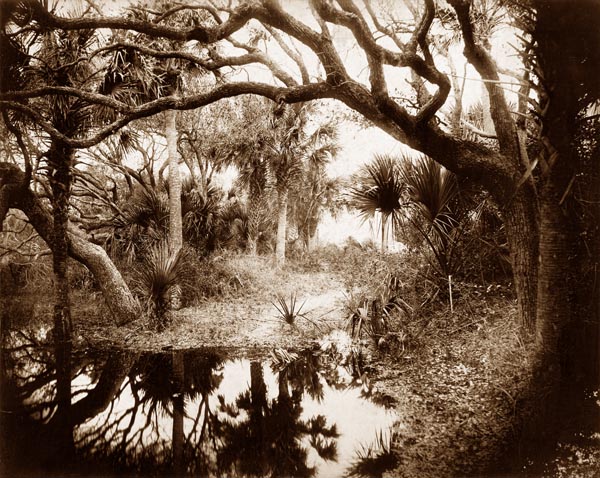
‘Live Oaks and Palmetto, Everglades, Florida’
George Barker (American, 1844 - 1894), Getty Open Content Program
Teardrop
(Larme)
1. (From: Dernier Vers 1872)
Far from the village girls, cattle, birds,
I drank, kneeling down in the heather
Surrounded by tender copses of hazel,
In the green warm mist of afternoon.
What could I have drunk from that young Oise,
Elms without voices, turf without flowers,
Shut sky? Or sip from the gourd of the vine?
Some liquor of gold that causes pale sweats.
Like that I’d have made a poor inn-sign.
Then storms altered the sky till evening.
Black landscapes, poles, lakes, colonnades
under the blueness of night, rail-stations.
Wood’s water was lost in virgin sand.
The wind, out of heaven, iced the ponds...
But, like fishers for gold or shells, to think
That I didn’t take the trouble to drink!
![Ruins of the Railroad Depot, Charleston, South Carolina [Detail]](https://www.poetryintranslation.com/pics/French/interior_rimbaud_teardrop.jpg)
‘Ruins of the Railroad Depot, Charleston, South Carolina [Detail]’
George N. Barnard (American, 1819 - 1902), Getty Open Content Program
2. (From: Une Saison en Enfer 1873)
Far from the village girls, cattle, birds,
On my knees, what was I drinking there,
Surrounded by tender copses of hazel,
In the green warm mist of afternoon?
What could I have drunk from that young Oise -
Elms without voices, turf without flowers,
shut sky - from these yellow gourds, far from my
dear hut? Some gold liquor that causes sweats.
I made a dubious inn-sign. - A storm
Came to hunt the sky. At evening
Wood’s water was lost in virgin sand.
The wind, of God, iced the ponds:
Weeping, I saw gold – and could not drink!
The Song of the Highest Tower
(Chanson de la Plus Haute Tour)
1. (From: Fetes de la Patience)
Idle Youth
By all things enslaved
Through sensitivity
I’ve wasted my days.
Ah! Let the moment come
When hearts love as one.
I told myself: wait
And let no one see:
And without the promise
Of true ecstasy.
Let nothing delay
This hiding away.
I’ve been patient so long
I’ve forgotten even
The terror and suffering
Flown up to heaven,
A sick thirst again
Darkens my veins.
So the meadow
Freed by neglect,
Flowered, overgrown
With weeds and incense,
To the buzzing nearby
Of a hundred foul flies.
Ah! Thousand widowhoods
Of a soul so poor
It bears only the image
Of our Lady before!
Does one then pray
To the Virgin today?
Idle Youth
By all things enslaved
Through sensitivity
I’ve wasted my days.
Ah! Let the moment come
When hearts love as one.
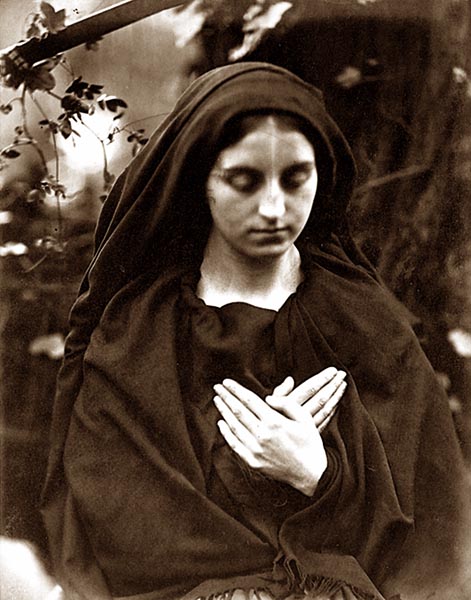
‘Il Penseroso’
Julia Margaret Cameron (British, born India, 1815 - 1879), Getty Open Content Program
2. (From: Une Saison en Enfer)
Let it come, let it come
The day when hearts love as one.
I’ve been patient so long
I’ve forgotten even
The terror and suffering
Flown up to heaven,
A sick thirst again
Darkens my veins.
Let it come, let it come
The day when hearts love as one.
So the meadow
Freed by neglect,
Flowered, overgrown
With weeds and incense,
To the buzz nearby
Of foul flies.
Let it come, let it come
The day when hearts love as one.
Eternity
(L’Éternité)
1. (From: Fetes de la Patience)
It’s found we see.
What? – Eternity.
It’s the sun, free
To flow with the sea.
Soul on watch
Let whispers confess
Of the empty night
Of the day’s excess.
From the mortal weal
From the common urge
Here you diverge
To fly as you feel.
Since from you alone,
Embers of satin,
Duty breathes down
With no ‘at last’ spoken.
There’s nothing of hope,
No entreaty here.
Science and patience,
Torture is real.
It’s found we see.
What? – Eternity.
It’s the sun, free
To flow with the sea.
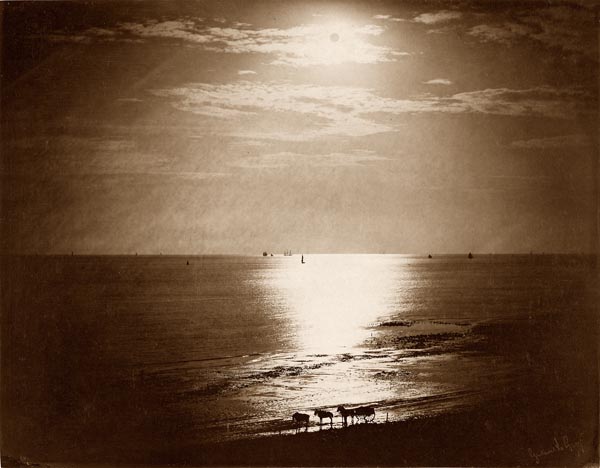
‘Le Soleil au Zénith - Océan’
Gustave Le Gray (French, 1820 - 1884), Getty Open Content Program
2. (From: Une Saison en Enfer)
It’s found we see!
What? – Eternity.
It’s the sun, mingled
With the sea.
My immortal soul
Keep your vow
Despite empty night
And the day’s glow.
So you’ll diverge
From the mortal weal
From the common urge,
And fly as you feel...
– No hope, never,
No entreaty here.
Science and patience,
Torture is real.
No more tomorrow,
Embers of satin,
Your own ardour
The only duty.
It’s found we see.
– What? – Eternity.
It’s the sun, mingled
With the sea.
O Seasons, O Chateaux
(Ô saisons, Ô châteaux)
1. (From: Fetes de la Patience)
O seasons, O chateaux,
Where is the flawless soul?
O seasons, O chateaux,
The magic study I pursued,
Of happiness, none can elude.
O may it live, each time
The Gallic cock makes rhyme.
Nothing else I desire,
It’s possessed my life entire.
That charm! It’s taken heart and soul
Scattered all my effort so.
Where’s the sense in what I say?
It makes the whole thing fly away!
O seasons, O chateaux!
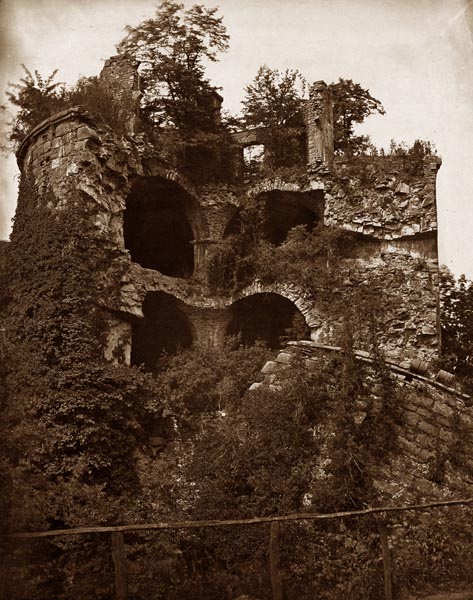
‘Heidelberg Castle’
Adolphe Braun (French, 1811 - 1877), Getty Open Content Program
2. (From: Une Saison en Enfer)
O seasons, O chateaux!
Where is the flawless soul?
The magic study I pursued,
Of happiness, none can elude.
A health to it, each time
The Gallic cock makes rhyme.
Ah! There’s nothing I desire,
It’s possessed my life entire.
That charm has taken heart and soul
Scattered all my efforts so.
O seasons, O chateaux!
The hour of its flight, alas!
Will be the hour I pass.
O seasons, O chateaux!